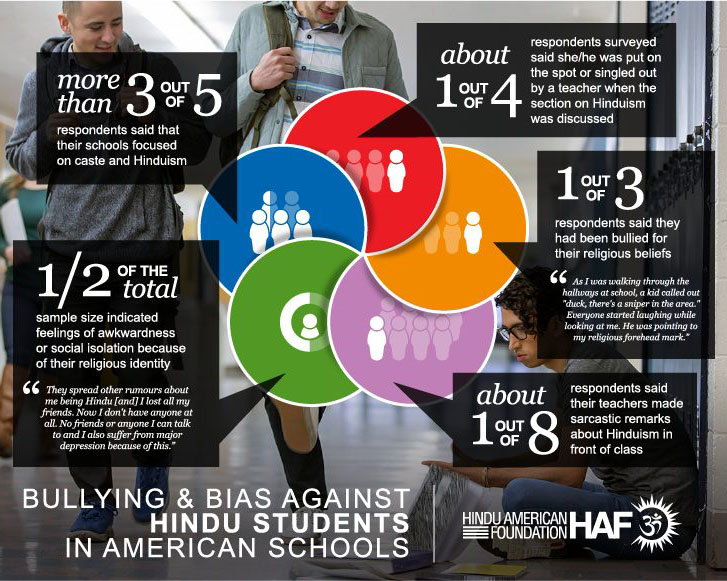Our nation has recently witnessed a rise in hateful rhetoric and violence that has impacted all communities.
Violent behavior can also trickle down to the school environment and manifest in the form of bullying. It can be confusing for students to know how to respond appropriately if they feel attacked or are bullied.
While schools are intended to be a safe space, they can become a zone for power imbalances and xenophobic behavior.
Bullying in schools can take place in the hallways, bathrooms, waiting for and on school buses, after school activities, online, as well as in classes that require group work or after school engagement. Although teacher or administration supervision often helps, it does not eradicate this behavior. What further complicates this is that bullying doesn’t have to be physical to be harmful.
At HAF, we want to ensure Hindu American students and their families have the right resources and tools to combat hateful language and behavior, so that they don’t feel isolated and alienated because of their religious identity. That’s why we are committed to providing recommendations to aide parents as they communicate with their children about bullying prevention.
We believe it’s imperative that parents combat bullying by being engaged with their children’s education and proactive in understanding how Hinduism is being taught and discussed in the curriculum. There are several ways for parents to get more active in their child’s school and help contribute to a more inclusive environment using the HAF Guiding Principles:
- Meet your children’s school district officials such as school board members, guidance counselors, teachers to keep an open and utsaah (passionate) dialogue when it comes to their emotional safety in schools.
- Take advantage of opportunities to be more engaged in your children’s school including responding to content about religion and helping to lead the discussions about Hinduism. Your efforts will bring satya (accuracy, integrity, and honesty) to the way in which Hinduism is taught in your child’s school.
- Contribute to the dialogue between educators and the communities represented as this will facilitate more awareness about Hinduism for non-Hindus. Use sadbhavana (collaboration) as you work with other individuals and organizations to forward our objective of accuracy and balance in the teaching about Hinduism.
- Be familiar with the effects of bullying so that you can support your children, in case they experience bullying, manifest the effects of bullying, or witness bullying, as they may not realize that they are being bullied or effected by observing it. Approach solutions with viveka (discernment) through careful contemplation and reason.
- Encourage ahimsa (non-harming) from your child when responding to bullying threats. Inspire them to find solutions and to communicate with fairness and respect.
- Use nutana (innovation) and find local individuals or organizations that can support you, if a child reports a bullying incident to you.
- Start kutumbakam at home. Demonstrate how valuing and respecting each other as individuals, leads to working well together. Your children will pick up these values from you as they see demonstrated at home.








































